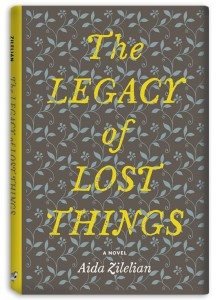Special for the Armenian Weekly
It has been several months since the release of my debut novel, The Legacy of Lost Things. I wrote it during a time in my life when an avalanche of difficulties was slowly conspiring to gather all of its force and unleash itself weeks before my daughter was born: I lost my job, my stepfather Aris passed away, and then my father’s wife suddenly died. Somehow, I completed my novel.

I had started writing it as a sequel to my first novel, The Hollowing Moon, which has not yet been published. It is about Araxi Yessayan, an Armenian teenager who resides in Queens, N.Y., and lives an unhappy life with her parents, her sister Sophie, and her grandmother. In my first novel, Araxi runs away with a school friend and disappears to the Midwest. When I started writing The Legacy of Lost Things, I decided to write from the perspective of each family member Araxi had left behind—her father Levon, her mother Tamar, her sister Sophie, and several other characters in the novel.
As a child raised in a traditional Armenian household, I was educated about the Armenian Genocide extensively, and knew as well that my grandfather Garabed Zilelian had been orphaned in the massacre when he was four years old. There had been so much material brought to light since then. The documentation and staggering evidence has been a burden on the Armenian people because of the many years of denial on the part of the Turkish government. Although I was a first-generation Armenian I felt burdened for those same reasons as well as others.
The specific details of my grandfather Garabed’s survival was never imparted to me, and he died years before I was born, but I had been told by family members and friends of the family that he was a very tough man with a very short temper. He also had the tendency of being physically violent. I tried to imagine how the trauma in his life had taken a toll on him, and how that sense of violence and uncontrollable anger had passed down to my father and his sister. As the granddaughter of a genocide survivor I realized how it cast a shadow on my childhood and my upbringing.

I wanted to avoid writing about the genocide. There are so many books that have already been written, and I honestly didn’t feel that I would have much to contribute. However, I did recognize that the events of the genocide would play an important role in the telling of my story. It would set the tone for the misfortunes of the characters as well as the theme of escape and violence that repeats itself within three generations of a family. It would not help the reader tolerate the actions of my characters, but it would provide a lens to look through. This is how the idea of The Legacy of Lost Things came to light.
“How much of the characters in your novel are based on real people?” I have been asked this question in almost every interview since my novel’s release. I have demurely deflected, intentionally navigated away from the truth: Each character in my novel is based on my family members. The novel and the events in the novel are fiction, but the characters are as real to me as my own family. The flaws of my characters are exaggerated in order for the events in the plot to connect deeply and cohesively. Regardless, there is more truth in my book than there isn’t.
As I first began writing the novel, I struggled with the irredeemable qualities of my characters. When I was writing from the perspective of Levon, the jealous and violent father, it was difficult not to vilify him. When I was writing from the perspective of Tamar, the depressed and detached mother, making her human seemed impossible. I was very conscious of creating one-dimensional characters that were visibly drawn in black and white. In the midst of tackling this dilemma my entire world turned on its head: My mother became a widow; and my father, who had been ill and bedridden for years, and who had solely depended on his wife as his caretaker, was now a widower. And then I was a mother.
The paradoxes and ironies of my life during this time are too many to sift through. But quite literally, my perspective changed, and so did those of my characters. The cutout cardboard figures that were silhouettes of my family sprang to life and became as dear to me as those who I love because I could finally accept and understand who they truly were. This is my shortcoming—I could only view my parents as their daughter, not who they were wholly as human beings.
Since the release of my novel, I have been on a book tour in Los Angeles and I will be going on an East Coast book tour this summer. I feel fortunate in reading so many positive reviews of the book. I wonder if any Armenians have been able to relate to the circumstances of my characters or the themes that my novel draws upon. I find that I’m still reaching for success because my definition of the word keeps shifting from one ephemeral ideal to another. I hope that my novel reflects characters with depth and understanding despite their actions, which many readers will find unforgivable.
Upcoming Book Events
Washington, D.C.
Tues., July 14
6:30-7:30 p.m.
Kramer Books
1517 Connecticut Ave NW
Washington, D.C.
Wed., July 15
6:30-7:30 p.m.
Barnes & Noble (CUA)
625 Monroe St. NE
Washington, D.C.
Connecticut
Sun., July 26
Barnes & Noble
2-3 p.m.
North Haven Crossing (shopping center)
470 Universal Drive North
North Haven, CT
Rhode Island
Thurs., Aug. 6
6-7 p.m.
Barnes & Noble
1350 Bald Hill Rd.
Warwick, R.I.
Massachusetts
Wed., Aug. 12
7-8 p.m.
Barnes & Noble Boston Prudential Center
800 Boylston St.
Boston, Mass.
Thurs., Aug. 13
6-7 p.m.
New England Mobile Books
82 Needham St.
Newton Highlands, Mass.


Be the first to comment